“We’re doing nothing with our lives,” Yuri Orlov states, holding a gun magazine in one hand, and an UZI SMG in the other. The setting is Brighton Beach. His brother Vitaly, a burgeoning alcoholic and a chef, utters what could be a cautionary tale for not just their lives, but for a generation of violence-desensitized people to soon follow. “You’re right. But maybe doing nothing is better than doing this.”
Nicholas Cage plays Orlov, an international arms dealer whose trade is born out of boredom of his common existence and his desire to do something big with his life. An immigrant from Ukraine, Orlov has that love of American opportunity and success, and a flare for charisma, that makes him an easy choice for the job. “All my life I was running away from violence when I should have been running towards it,” he narrates in one scene. He is driven by his desire to supply, as he puts it, one of mankind’s most basic needs – guns.
“Lord of War” is a sweeping epic, and could almost be characterized as a rise-and-fall story except for the fact that it’s anti-hero, Orlov, never falls – at least not completely. With the help of his brother Vitaly (Jared Leto), he quickly moves up in the gun trade, supplying first gangsters in Brighton Beach, to ultimately international contacts in Sierra Leone, West Africa, Russia, Bosnia, and countless other locales. He never supplied Osama Bin Laden – not because of moral issues, but because, he narrates, Osama was always bouncing checks.
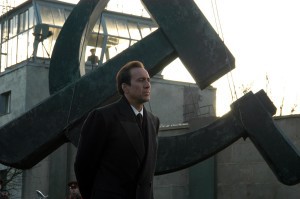
Amidst becoming a professional gunrunner, Orlov meets and marries the woman of his dreams, Eva Fontaine (Bridget Moynahan, “The Recruit”), a fellow Ukrainian immigrant, and attracts the attention of an overzealous Interpol agent, Jack Valentine (Ethan Hawke). His relationship with both is built on lies. With Eva, she is content to bask in the luxury that his lifestyle affords without asking too many questions until she is already in way too deep. With Valentine, who asks all the right questions, Orlov is always one step ahead – both legally and literally – and is never caught unawares.
One of the strong points of the movie is that it avoids the temptation to moralize. Orlov does things, things which he thinks are neither good nor bad but simply necessity, and the only gauge to the seriousness of these acts come from the effect they have on those closest to him. Early in the film his sales reap money and status; he amasses a small fortune, and everyone in his life – Eva, Vitaly, his father – seem the better for it.
“Lord of War” also paints history in a different brush. We get to see the fall of Communism in Russia, which brings on great excitement in Yuri – not because there is a chance for peace in the once totalitarian regime, but because he sees all the guns, and dollar signs, he can reap. A consummate businessman, one who has no real talent or drive for violence (seen terrifically as he cringes multiple times when seeing people killed with the very weapons he is supplying), Yuri got into the gun trade simply because it was easier. “The problem with going legitimate is that everyone’s doing it,” he narrates. “The margins are too low.”
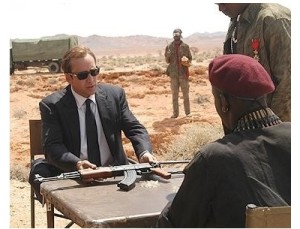 One of the problems with “Lord of War,” is one of the same problem one could cite with Jude Law’s performance in “Enemy at the Gates.” There is just no attempt by Cage to come off as Ukrainian. His intonation hits in the same charismatic, enthusiastic way as “Con Air,” “The Family Man,” or a dozen other of his films. Interestingly Leto, who uses no accent either, comes off as much more Ukranian than Cage, the film’s main character. However, to Cage’s defense, neither does Moynahan. It’s as if Director Andrew Niccol didn’t feel the need to paint the nationality of these characters, as if the subject matter and its implications were enough to relay his vision. He’s not really too far off the mark.
One of the problems with “Lord of War,” is one of the same problem one could cite with Jude Law’s performance in “Enemy at the Gates.” There is just no attempt by Cage to come off as Ukrainian. His intonation hits in the same charismatic, enthusiastic way as “Con Air,” “The Family Man,” or a dozen other of his films. Interestingly Leto, who uses no accent either, comes off as much more Ukranian than Cage, the film’s main character. However, to Cage’s defense, neither does Moynahan. It’s as if Director Andrew Niccol didn’t feel the need to paint the nationality of these characters, as if the subject matter and its implications were enough to relay his vision. He’s not really too far off the mark.
Accents and nitpicking aside, “Lord of War” is a comedic yet serious glimpse into the world of illegal arms dealing in a way we’re not used to seeing. It’s sexy yet dangerous, profitable yet deadly. As Yuri is pulled deeper and deeper into his world, his grip on reality blurs (especially as he is finally forced to confront his morality as he deals with the ruthless President of Liberia (Eammon Walker), and as his wife begins to question his profession and life choices with increasing intensity).
The movie isn’t told as a cautionary tale, but certain parts, especially narrations by Orlov toward the end, come off as macabre and prophetic. He speaks like a man who knows he is damned, but hasn’t admitted it to himself yet. Part of the success of his commentary comes from the seriousness of the material. However, most comes because Cage truly owns his character. He understands his motivations and convinces us of his point of view in a way reminiscent of Michael Douglas in “Wall Street.” His choices are vile, but by the time he realizes this, it may already be too late.
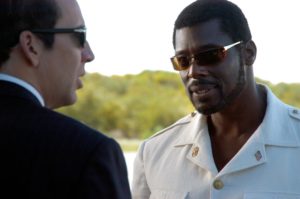
“Lord of War” has something to offer many audiences. It’s historical, prophetic, and serious. It features good performances by good actors. Leto turns in a surprisingly effective and heartfelt performance as Orlov’s spiritually ailing brother. Ethan Hawke, like Cage, completely owns his character and makes us believe in his quest to stop Orlov at all costs. Moynahan, a rival dealer (played by Ian Holm), and Eammon Walker add depth and drama to an already serious movie. There are probably more concise and more poignant forays into the world of gun running. But, for its effort, morality, and heart, you could do a lot worse than “Lord of War.”
– by Mark Ziobro
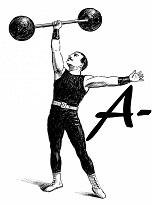

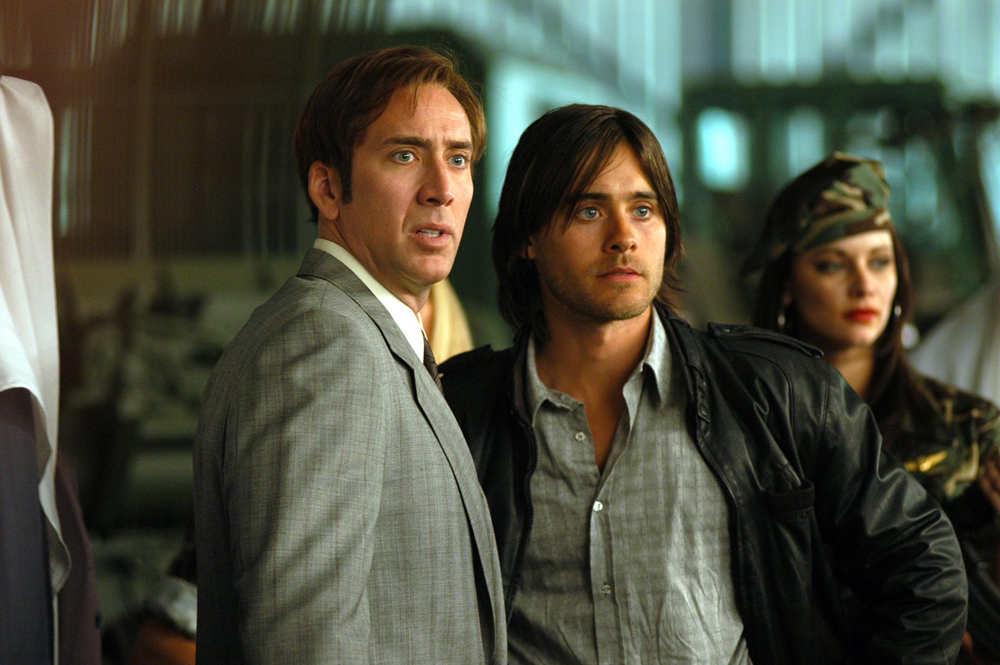
2 Comments
Pingback: » The Family Man (PG-13)
Pingback: » The Purge (R)